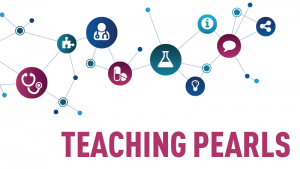Educator-to-Educator Tips & Strategies
Find out how your peers are making the most of Aquifer cases and teaching tools.
Find out how your peers are making the most of Aquifer cases and teaching tools.

At Florida Atlantic University Charles E. Schmidt College of Medicine, we are supporting our fourth-year students with flexible online elective rotations by adapting the model we created during COVID. Our virtual asynchronous electives–built with Aquifer cases and WISE-MD modules and implemented on the fly during lockdown–proved valuable to students, earning positive feedback and course reviews. With a few minor modifications, we are continuing this offering in response to student requests and the wide range of time-consuming requirements in the fourth year.

Touro University California Physician Assistant Program has been utilizing Aquifer cases since 2019. Originally, the cases were assigned to clinical year students to fill knowledge gaps and remediate rotations. Clinical year students found reviewing concepts in Aquifer cases during the virtual rotation block very valuable and found that cases improved in-person patient encounters.

At Florida Atlantic University Charles E. Schmidt College of Medicine, we are supporting our fourth-year students with flexible online elective rotations by adapting the model we created during COVID. Our virtual asynchronous electives–built with Aquifer cases and WISE-MD modules and implemented on the fly during lockdown–proved valuable to students, earning positive feedback and course reviews. With a few minor modifications, we are continuing this offering in response to student requests and the wide range of time-consuming requirements in the fourth year.

We all know that every student will have a slightly different experience in each of their supervised clinical practice experiences (SCPEs). At our program, we’ve been using Aquifer cases to augment learning, build key communication skills, and supplement clinical experiences to meet ARC-PA standards.

When the pandemic hit, Harvard Medical School called upon the radiology clerkship committee to provide a virtual clerkship. With one week of preparation, we constructed the 4-week clerkship around the 19 Aquifer Radiology modules and a combination of large group lectures and small group homerooms.

This summer I began my first clinical rotation of my third year in Family Medicine. Due to local COVID-19 precautions, the first half of our rotation was being conducted virtually. During that time, we were encouraged to complete the Aquifer Family Medicine cases. In my experience, the cases were a helpful bridge to patient care from my coursework…

This year, COVID added additional challenges to the difficult transition from pre-clinical to clinical/clerkship years by limiting student and faculty interactions during the traditional orientation week. We used Aquifer to create an online Orientation Course for our LIC students that addressed multiple key concepts and facets of the transition to the clinical/clerkship years and allowed our team to focus our limited in-person time on crucial activities.

In our Longitudinal Integrated Clerkship, students transitioned patient-based clinical learning from real patient to Aquifer cases in late March. These more advanced level clerks required that virtual cases have increased complexity to adequately challenge them and continue building their clinical skills. In order to meet these learning demands, Aquifer cases were introduced as written and then modified in preceptor lead discussions to encourage further clinical reasoning skill development.

Like everyone else, our school needed to develop alternatives for our new fourth-year students due to the COVID-19 pandemic. With an uncertain return date for students at a range of clinical sites, we decided to build virtual, asynchronous electives that would help prepare students for their clinical rotations, and especially their Acting Internships. We leveraged a range of case-based online modules to cover different disciplines, including Aquifer and WISE.

Like many others, Boston University moved to a shortened virtual-only clerkship (packed with the full knowledge of our regular in-person 6-week clerkship, of course) in March of 2020. We were able to leverage Aquifer cases as a framework for preceptor discussion sessions and learning activities. The plan outlined below was for our 2-week virtual pediatrics clerkship, but I think the framework could apply to a variety of clerkships or courses transitioning to virtual group discussions.

Due to curriculum modifications related to the COVID-19 pandemic, our clerkship directors were charged with developing a virtual curriculum to keep students engaged in clinical learning activities while suspended from participation in face-to-face clinical care. Rather than develop a virtual curriculum for each individual clerkship…